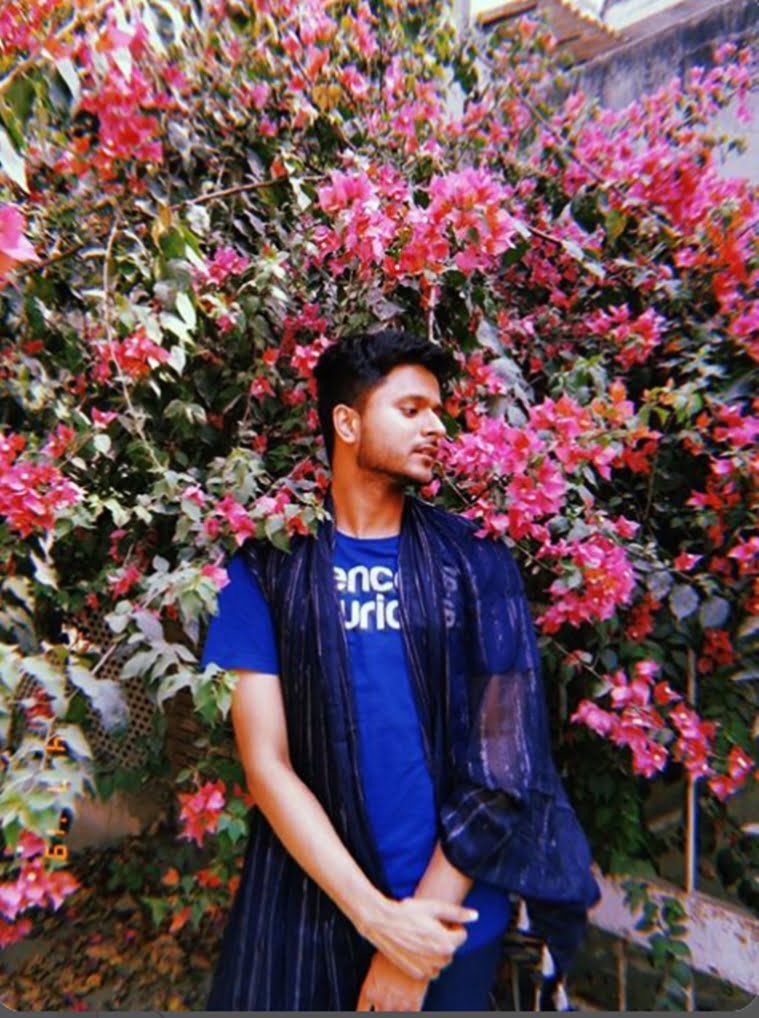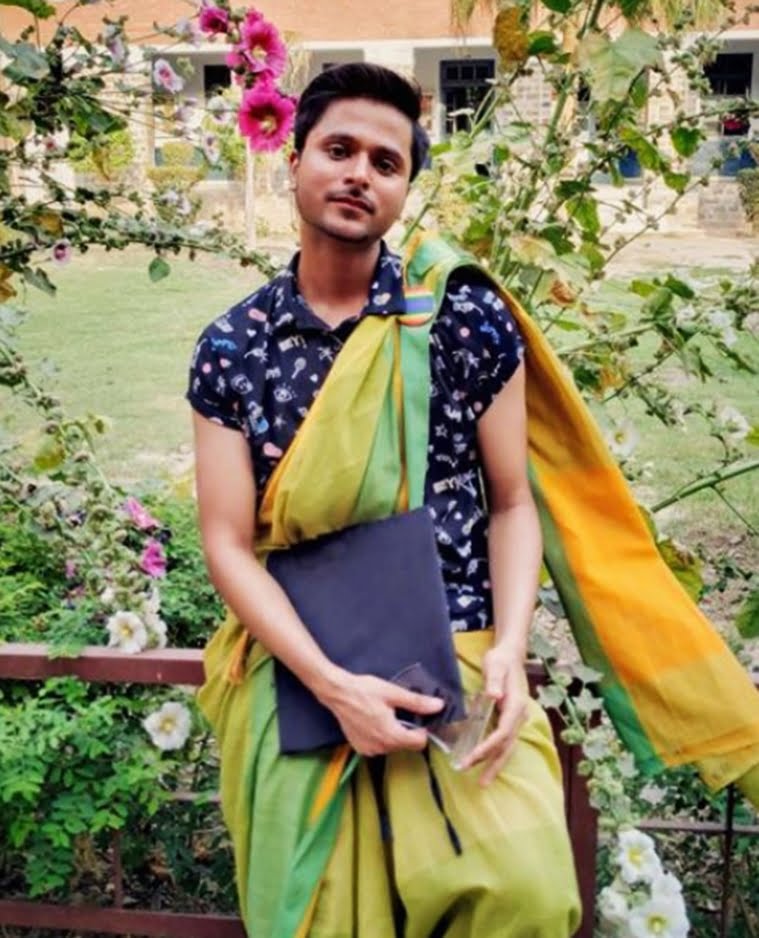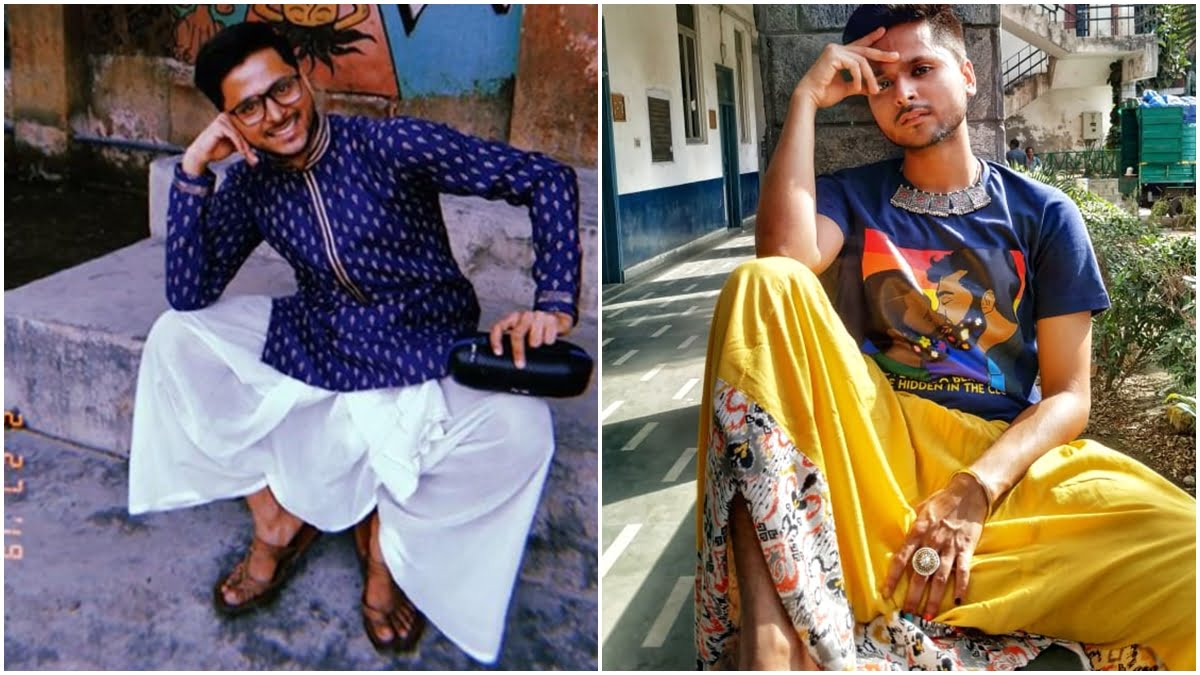Being born in a middle-class Rajput family was not a choice I made. As a child in his own bliss of innocence and ignorant of the ways of society, I enjoyed basking in the glorious orbs of my ma’s jewellery and sarees. Unlike boys my age, speeding and force were never my gaming zones. What was an anti-thesis of conventional masculinity, the tenderness and beauty of dolls often lured the younger me into playing with them; dressing them up as gorgeously as Nani would find me with those heavy, dark locks and big, round eyes of mine that shimmered in the attire of a bride. Dressing up as the dulhan in the ‘dulha- dulhan’ game, wearing maasi’s dupatta as a hairpiece and dancing wholeheartedly without an ounce of care for the world on Madhuri Dixit’s Bollywood numbers opened the non-negotiable realm of the society for me; an arena I would bargain for by giving up all I had, if only I knew what lay ahead.
To successfully distance yourself from the prevalent norms of the society that aspires to instill in you every single grain of prejudice from childhood is a Herculean task that cannot be accomplished without any support and in isolation.
Also read: Why We Need To Reject Toxic Masculinity For Better Mental Health
While growing up, I did not share a friendly relationship with my father. Like most dad-son bond, ours was also garbed by the shades of masculinity where the proclamation of love and expression of feelings lay suppressed somewhere. To make a man out of his effeminate son (whose walk and words resonated with feminine tenderness rather than manly toughness), papa resided into relentlessly beating me even at the slightest of my mistakes. He detested my speaking of Bhojpuri, our mother tongue as he felt it made me sound like a ‘mauga’ (a Bhojpuri word for effeminacy and implying a lack of masculinity). I was unknown to the amiable side of parenting for the most part of my childhood; it resurfaced only in certain instances when ma was around. Her working in a different district often stole this bliss away. Where on one side home had this to offer, the school only worsened my mental peace and added to my trauma of ‘being different’.
Known to be one of the primary spaces for the formation of one’s identity and shaping up of personality, school contributed in highlighting my so-called lack of masculinity further, making me known as ‘a chakka, a hijra’ thrown like daggers at me by my schoolmates in the utmost derogatory sense.

Known to be one of the primary spaces for the formation of one’s identity and shaping up of personality, school contributed in highlighting my so-called lack of masculinity further, making me known as ‘a chakka, a hijra’ thrown like daggers at me by my schoolmates in the utmost derogatory sense. The notion of your name reflecting as your identity became a blurred idea for me. There were a very few days of my school life when I was not bullied or humiliated, and hence, it is hard to forget the rest which had become ‘my normal’ for not being normal. An incident of one such day etched clearly in my memory was when a classmate sitting behind me had tainted my shirt with the alphabets- ‘SIXER’ (an abuse for queer people). The courage and strength that I had been mustering all this while which had been secretly pushing me to move ahead each day had now shattered in many tiny fragments which felt like an eternity to put together.
I tried every possible way that could stop me from going to school ever again even if it involved intentionally hurting my own leg, but alas, to no avail. For once, after years, I had led down my shield of masculinity and had cried in the warm and secure arms of ma, cursing my birth and my own existence.
Also read: Mard Ko Dard Kyon Nahin Hota?— On Hegemonic Masculinity
The torment of years could not be calmed with her wise words. So taking the onus on her to set it all right, she spoke to my class teacher about all that had been going on. This only worsened things. Everyone at school had stopped talking to me, and my existence had now disappeared. After matriculation, I took admission in humanities in a different school. My idiotic heart that
clings to every false hope led me into believing that this change of place would mark a new beginning of acceptance, kindness and warmth. Little did I know that humanities can only teach such notions but cannot force you into practising it. All my aspirations to be known as ADITYA in this new setting, among new people, were set on fire on the playground beneath the ravishing heat of the sun when a boy from my previous school called aloud to me “chakka, tu yahan!” I had decided not to succumb this time, so the ‘new me’ did not let them humiliate me on my face, but that did not stop it from happening behind my back. Anonymously referring to me in those same slangs, they now sounded like teenage slurs from a distance.
To exist equally was now forgotten. The exuberance and flamboyancy about my personality had now been boxed forever. Insecure in one’s own skin, I had started to feel suffocated in my own body. Choking halfway in swallowing a piece of mortin made me loathe myself for not having the cojones to free your own spirit. I started keeping to myself, an introvert who only found the resolute to breathe in the reality of his own identity either through comic books, TV series or movies. At times, I danced in front of the mirror, in my dad’s dhoti wrapped around as a ghagra to live my veracity. Yet, it never felt liberating enough for the doors were always locked, and loneliness was my only audience.

The process of change is not noticeable to the naked eye, nor is the human brain intelligent enough to register it until this change is visible on the outward. Standing on the stage in a yellow long-skirt, resonating my faith in blurred gender roles and belief in masculinity beyond the idea of clothing, in an auditorium stuffed with people, I was not only accepting the award for topping the second year of college but also sinking in the realization of how three years of undergraduation in Delhi University’s Ramjas empowered me to accept myself the way I am, to love myself beyond the horizon and to believe the notion that the sky can be your only limit. This realization and acceptance did not enter my system overnight but was a process of constant unlearning of what society had breathed into me ever since birth and learning to put your individuality beyond the flawed spectrum of prejudices and stereotypes.
Residing in Ramjas boys hostel, it was tough to be surrounded by men who would question your manhood and masculinity in your every action made me feel vulnerable beyond my threshold. But the beautiful course I was enrolled in helped me understand how fragile the word ‘masculinity’ is and the constant load and pressure it puts upon the males of our society.
To say that it was a cakewalk would be utter nonsense and a lie. For these three years of my graduation, I resided in Ramjas boys Hostel. Initially, it was tough to be surrounded by men who would question your manhood and masculinity in your every action made me feel vulnerable beyond my threshold. But the beautiful course I was enrolled in helped me understand how fragile the word ‘masculinity’ is; the constant load and pressure it puts upon the males of our society ‘to become a man’, to be conditioned as insensitive (because societal notions of masculinity demanded that you don’t feel) and to avoid all the discussions and talks about this normalized oppression and constraint as it would manifest their ‘unseen, unknown side of femininity’, as if it would somehow diminish the notions of masculinity they were protecting.
Understanding this helped me soothe my anger towards my father. It helped me see his unfortified concerns for his son and being the product of his times, he gave into the methods of his father’s upbringing. Of late, I have been vocal about my feelings, and this has mended our bond. Delhi, in all its colours brought with it some angels in the form of the most understanding humans in my life. Without their support and irrevocable faith in me, I would have never dared to take such a big leap from constant insecurity and loathing to this unalterable belief in myself to become whoever I wanted to be.
With time and maturity of this enlightenment, I can now even comprehend the strength and beauty of my sexual orientation. I am a gay guy who happens to fall for wrong men always. To love them has always felt like ‘we’ have never belonged to this tangible place, neither do our hearts and yet, here we are, I am making love as we make love to life with no strings attached. This tantalizing fragrance of love with same-sex has ephemerality and the strength of Petrichor – intense but short. Every time I have fallen in love, I have had a different experience, just like the varied spectrum of sexuality. Still, one thing that has been common to all is how easily a man can accept his vulnerability behind locked doors, but even his balls cannot help him do so in the outer world; how everyone is a little gay or have a ‘gayish’ side to them that can be hidden well behind a facade but to have it portrayed boldly is to bathe in the unpretentious mirth of a unicorn ride over the slide of a rainbow.
Aditya Singh is currently pursuing Master’s in Literature from University of Delhi. He is a regular human who wants to believe that this world can be beautiful. He can be found on Instagram.
All photos as provided by Aditya Singh




